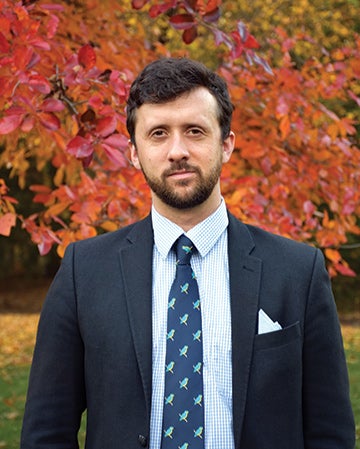Dirty Laundry
Analyst and investigative journalist Casey Michel is hanging money launderers out to dry.

Casey Michel ’10 has never been afraid to delve into tough subjects. After graduating from Rice, he served in the Peace Corps in Kazakhstan, then returned to the U.S. and earned his master’s degree in Russian, Eurasian and East European studies at Columbia University. An adjunct fellow with the Hudson Institute’s Kleptocracy Initiative, Michel’s expertise on oligarchs, corruption and illicit finance have led to his first book, “American Kleptocracy: How the U.S. Created the World’s Greatest Money Laundering Scheme in History.”
Where did the idea for “American Kleptocracy” originate?
My time in the Peace Corps is really where some of the more particular elements of the book began to congeal. That was my first time living and working in a country that was overseen by someone [Nursultan Nazarbayev] who fits this traditional mold of dictatorship. He’s in power for years and years; he seems to be doing nothing but enriching himself, his family members and their inner circles. But then where does that money go? What is that money being used for? I started realizing that corruption, that even dictatorship, isn’t restricted to one place. Their influence, efforts and especially money cross borders, cross hemispheres, cross jurisdictions. And unfortunately, in the case of the dictator of Kazakhstan, as well as many others, so much of that money ends up coming back to the United States.
What prompted your focus on the individuals in your book?
There were many candidates to choose from, which is an unfortunate reality. But I ended up choosing two for a simple reason: They’re using identical financial pathways to hide and launder their money, but I viewed them as bookends to the phenomenon.
On the one hand, you have Obian [Teodoro Nguema Obiang Mangue of Equatorial Guinea], whose father is the longest-serving dictator in the world. He fits a caricature of crass consumerism: private jets, yachts, cars. He’s got the biggest collection of Michael Jackson memorabilia in the world, and he is moving and hiding much of his money in the U.S., using American loopholes and services
to do so.
Then you have [Ukrainian oligarch Ihor] Kolomoisky, who uses similar financial networks, but he’s not buying mansions, supercars or yachts. He’s buying property in these small towns across the Rust Belt that we would never associate with modern international money laundering, and no one’s paying any attention to it whatsoever.
Russia’s invasion of Ukraine has brought a new urgency to this discussion. You recently testified at a Senate Judiciary Committee hearing on the Department of Justice’s Task Force KleptoCapture. Tell us about that.
The threats of modern and unchecked kleptocracy, and the U.S.’s role within that, have a sudden salience to them. The DOJ’s new task force is seizing assets from all these oligarchs. I was [in Washington, D.C.] testifying on how these oligarchs should be understood as wider prongs of [Russian President Vladimir] Putin’s regime, what the Kremlin is attempting to do, both in Europe and in the U.S., and why we need to expand the toolbox of available tactics.
At the end of the day, the thing to remember is that kleptocracy — and corruption — is not something that exists in one country, in one place, with one regime. It crosses borders. It crosses hemispheres
Are we on the right path?
When I was working on the book in 2020, if you’d asked me about where things were going, I would not have been nearly as optimistic as I am now. It has been remarkable to see how much has changed over the last year and a half. So I am perhaps surprisingly optimistic about where things are going, both in the U.S. and abroad. It’s still a very bipartisan space. The hearing wasn’t contentious. It was very clear that both Democrats and Republicans are fully in support of any number of these policy responses moving forward.
Tell us about your next book, “Foreign Agents.”
It’s very much a complement to the first book, looking at how foreign governments — especially nondemocratic foreign regimes — access and then manipulate American foreign policy to their own ends. So it’s going to be looking at the broader history of how foreign governments access policymakers in Washington, how they whitewash the images and reputations of their own regimes, and especially how they use Americans to help them do so. How they use American PR consultants, how they use American law firms, how they use large-scale donations to American nonprofits, to launder their own reputations, and then gain access to policymakers in Washington to do anything they want — whether that’s increase military aid, increase financial aid, remove sanctions, entrench these regimes — however they see fit.
What is our take-home message?
At the end of the day, the thing to remember is that kleptocracy — and corruption — is not something that exists in one country, in one place, with one regime. It crosses borders. It crosses hemispheres. It’s transnational in scope, which is where the U.S. comes into play, because the U.S. is the one providing all these financial secrecy services that these oligarchs and kleptocrats require. So if nothing else, kleptocracy and corruption in the 21st century is an international phenomenon. It’s not something that we can just ignore and not concern ourselves with because, boy, it’s a new world. We’re still figuring things out. And we’ll get there. I’m still optimistic.
— Jenny West Rozelle ’00
